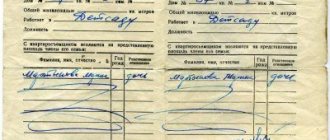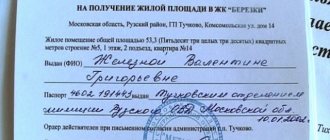In what cases can privatization be refused?
There are legitimate reasons for the authorities’ refusal to enter into a privatization agreement:
- One of the applicants has already participated in the privatization of housing.
- The citizens indicated in the warrant are not currently registered in this apartment.
- The order and all data about it are lost. In this case, you will have to go to court, where proof of rights can be registration, as well as information about payment of utility costs.
- The administration requires a warrant indicating the previous deceased residents who initially moved into this apartment, for example, the parents of the current residents. This is not legal. It is necessary to submit a paper indicating currently living citizens and their registration, or a social tenancy agreement.
Reasons for privatization
Legal relations between local authorities and individuals that arise during the transfer of residential real estate into private hands are regulated by the RF Housing Code dated December 29, 2004 and RF Law No. 1541-1 dated July 4, 1991. According to the approved rules, entities that legally occupy or have reserved living space have the right to privatize premises. Use of such a privilege is allowed only once or twice if the first registration of property occurred before the person came of age.
The legislator makes it possible to appropriate not just any property. The list of potential properties is limited. For example, it is prohibited to involve premises in emergency buildings, dormitories and buildings located in closed military settlements as objects in the privatization procedure. It will not be possible to become the full owner of a service apartment, because such property is classified as a specialized housing stock and cannot be transferred to individuals.
Important! A prerequisite for privatization is a social tenancy agreement. This is expressly stated in Art. 2 of Federal Law No. 1541-1.
Non-standard situations
Confusion with old and new forms of documentation gives rise to some special situations. Let's look at the most common cases.
It is necessary to contact the owner of the property, that is, the administration, so that they check their archival data and issue a document confirming the existence of the warrant. This may be an extract or a coupon, which will become the basis for concluding a social rent agreement. A duplicate is not issued, since it is not included in the register of existing documents. If previously this housing was in the department of some enterprise, you need to look for supporting documents in their archives.
We invite you to familiarize yourself with: Extension of an apartment lease agreement sample
If the administration refuses to issue such a certificate, or responds that there is no such data, it is necessary to file a claim in court. If a citizen is registered in the living space he occupies, there must be documents on the basis of which this fact takes place.
One of the residents has the right to refuse to participate in privatization. He will not be the owner on an equal basis with others, but will retain the lifelong right to reside in this apartment. Such a citizen can become an owner in the future only if one of the owners gives him a share.
Providing a warrant during privatization
Citizens who decide to become homeowners using state fund resources are required to collect a package of documents. In fact, this is one of the main stages of the privatization procedure. As a general rule, the required list of documentation does not include a warrant. However, in some cases this paper may still be needed. Applicants should consider the following when submitting an application:
- current legal norms do not require the submission of a warrant for privatization;
- the only documentary basis is the social rent agreement;
- after 2005, citizens who lived in apartments on the basis of Soviet-style documents must re-register and enter into a rental agreement;
- If the re-registration has not been done, in order to appropriate the property, you must first provide the remaining papers for occupancy. This will make it possible to transfer housing to social rent, and then carry out privatization.
Question:
Is it allowed to transfer ownership rights to an apartment from the local administration to a citizen if neither he nor his family members are registered there?
Answer:
The laws of the Russian Federation do not directly link registration at the place of residence or registration and the right to receive property in the process of privatization manipulations. However, this does not allow the applicant to register housing in which he is not registered. The fact is that actual residence in any place without registration is a violation of Law No. 5242-1 of June 25, 1993. For such actions, the violator faces an administrative fine. Moreover, even a long break in the current registration at the address of the privatized property often serves as a basis for refusing the applicant the gratuitous allocation of a house or apartment.
Order for an apartment for privatization: where to get it and how to privatize it if it is lost?
A warrant for an apartment is a document on the basis of which, in Soviet times, citizens moved into it.
According to current laws, this document has no legal force and a rental agreement is concluded instead.
But local authorities do not always have time to re-register documentation, so in some cases a warrant is the only confirmation of the rights of residents to the occupied property.
If you want to find out how to solve your particular problem, please use the online consultant form on the right or call. It's fast and free!
About how to determine whether your apartment has been privatized, where to start the procedure for registering ownership, whether this can be done through a realtor or by proxy, and also about what to do if someone registered is against privatization and whether it is possible to achieve the right to registration through the court, you can learn from our articles.
We suggest you familiarize yourself with: Documents for processing a mortgage return
In Soviet times, most citizens were familiar with the concept of a warrant for an apartment.
Over time, the document lost its force, and many happily forgot about its existence.
However, many tenants have to restore this paper, since the need has arisen to privatize the apartment using it.
If you want to find out how to solve your particular problem, please use the online consultant form on the right or call. It's fast and free!
- A warrant for an apartment is a document on the basis of which, in Soviet times, citizens moved into it.
- According to current laws, this document has no legal force and a rental agreement is concluded instead.
- But local authorities do not always have time to re-register documentation, so in some cases a warrant is the only confirmation of the rights of residents to the occupied property.
If you want to find out how to solve your particular problem, please use the online consultant form on the right or call. It's fast and free!
Hide content
The essence of the document
During the times of mass provision of free housing, move-in was carried out on the basis of a warrant.- It was a small document containing the data of those being moved in, the address of the facility, and the name of the issuing organization.
- The distribution of housing in those years was carried out by executive committees, so it was their seal that was on the document.
This document lost its legal status with the adoption of the new Housing Code of the Russian Federation in 2005. Therefore, today there is no such name on the privatization lists. However, the presence of this paper is necessary for drawing up a rental agreement, which means that without it, registration in the property is not possible.
Find out on our website whether it is possible to privatize a cooperative or service apartment, military personnel’s housing, a share, a room in a communal apartment or dormitory, as well as an apartment with debts.
Recovery
How to privatize an apartment using a warrant? As already noted, the order has lost its legal force in our time, so it is impossible to formalize privatization on the basis of it. However, in return, you need to draw up a rental agreement.
Where can I get a warrant for an apartment for privatization? To restore the warrant, you need to contact the local government authorities in whose territory the housing is located. The archives of this structure must preserve records of the allocation of housing to a specific person. Based on archival records, a certificate of grounds for moving in is issued.
It is currently impossible to obtain a duplicate order for an apartment for privatization, since such a document no longer exists.
The safety of the order will significantly reduce the time required to formalize the privatization of the living space, and will also prevent the authorities from refusing to draw up an agreement for the transfer of ownership of the apartment to individuals.
But his absence is not a disaster. Of course, you will have to make additional efforts to properly formalize the right to reside at a specific address, but, nevertheless, the issue has its own procedure.
How to privatize an apartment if there is no warrant? Rental agreements for residential premises serve as replacements for expired documents. It is they who currently serve as the basis for living in a certain municipal housing area.
If the organization that owns the building draws up all the documents as required by law, then the residents already have paper to replace those that are no longer valid. But in practice, officials do not always follow a similar procedure for conducting affairs.
There are three types of contracts, depending on the status of the housing and the organization of the owner:
- Social hiring.
- Commercial hiring.
- Free use.
Each of them contains information about the area and address of the occupied premises. They include all citizens registered at the time of registration in the apartment.
But in order to draw up an agreement, it is necessary to provide a warrant or obtain information about its existence earlier.
The action algorithm in this case is as follows:
- Contacting the REU, housing department or other organization servicing the house. If the house previously belonged to an enterprise, you need to contact the archives of the settlement or city administration. In these organizations you can get a copy of the coupon for the order or a certificate-extract from the archive.
- Having received the document, you need to contact the settlement administration and write an application to draw up a rental agreement.
- If the administration refuses registration, you should go to court with the certificate received.
Contacting the judicial authorities will save you from the need to go through the archives and search for the necessary coupons and certificates. The court will request everything necessary on its own.
In the statement of claim, you only need to provide a certificate of registration in this living space and attach the administration’s refusal to draw up an agreement.
After completing the contract, submit an application to the organization dealing with privatization issues at your place of residence.
The application will need to be accompanied by:
- personal documents of those registered in the apartment;
- applications from all those registered, including minors (from children under 14 years old, the application is submitted by parents, from 14 to 18 years old - the child fills out the document independently);
- a certificate of registration (or an extract from the house register);
- rental agreement;
- technical passport and floor plan drawn up in the BTI;
- cadastral passport of the object;
- extract from the Unified State Register from Rosreestr;
- a certificate of non-use of the right to privatization for each applicant (read about the right to re-privatization);
This package of documents and application can be submitted through the MFC.
After reviewing the documents and making a decision, a privatization agreement will be concluded with you, on the basis of which you will be able to obtain a Certificate of Ownership of the apartment from Rosreestr.
Timing and cost
It will take up to 30 days to draw up a rental agreement, after providing a warrant or coupon for it. It all depends on the efficiency and responsibility of the employees performing the work. The further procedure will take about two months.
We suggest you read: How to remove a sold car from the tax authorities
According to the Administrative Regulations (clause 2.7.1), 46 working days are allotted for registering the transfer of an apartment into the ownership of citizens.
When registering, you will need to pay a state fee:
- Technical passport and floor plan in BTI - from 1000 rubles.
- The state fee for registering a right in Rosreestr is 500 rubles.
- Notarized refusal of privatization – 500 rubles.
- Extract from the Unified State Register – 500 rub.
- Certificate of non-participation in privatization – 200 rubles. per person.
- The state fee for the Certificate is 2000 rubles. from each owner.
In total, it will take about 5 thousand rubles to complete all the necessary papers.
Controversial issues
When completing the housing privatization procedure based on a warrant, citizens often receive a refusal from the administration. The most common reasons are the following:
- The person is included in the order, but is not registered in the apartment at the time of privatization.
The persons registered at the moment are included in the residential rental agreement. The fact that someone has previously been included in the order does not mean that they must be included in the contract. Therefore, this citizen is not a participant in privatization and his share is not allocated. - The order for the apartment is lost, how to privatize the apartment in this case? DEZ also did not save information about him and on this basis refuses privatization?
These actions of the organization are illegal. If the order is lost, the DEZ is obliged to conclude a rental agreement with the residents.The basis for this is the Certificate of registration, plus you can attach an extract from your personal account and an apartment card to it. An unjustified refusal by an organization must be appealed in court; you can first file a complaint with the Housing Inspectorate.
- The warrant had previously been issued for citizens who died.
Currently, other people are registered in the housing, for whom the rental agreement has been drawn up. When submitting documents, the administration should not require the provision of a warrant with the data of those people who received the apartment. The basis for privatization is the rental agreement and the Certificate of registration.
Currently, you can register the privatization of your living space either with a warrant in hand or if it is lost. Make a little effort to collect documents, and the living space will safely become your property.
- Useful information in the video below:
Even in Soviet times, confirmation of rights to housing was a warrant, since it was simply impossible to privatize or buy residential real estate without it. If such a document is lost, the logical question arises of how to restore the order for the apartment, where to get it and where the relevant information on it is stored.
The warrant for a non-privatized apartment was the main document issued by the executive committee as permission to move into and live in the premises. It was a kind of analogue to a modern certificate of ownership of a real estate object, or even rather an analogue of a social tenancy agreement. Today the order has lost its legal force.
Our articles talk about typical ways to resolve legal issues, but each case is unique. If you want to find out how to solve your specific problem, please contact the online consultant form on the right →
If you want to find out how to solve your particular problem, call us by phone. It's fast and free!
- Personal passport and identification code (of the applicant and his family members who will live with him);
- Papers certifying the family relationship between the above-mentioned citizens who will eventually receive registration in the apartment;
- A warrant for living space as a basis for applying is not required, but it speeds up the registration process.
Privatization of an apartment under a social tenancy agreement: conditions
According to the law, a contract for social rental housing allows you to live in it without hindrance, but does not grant the right to use and dispose of the apartment from a legal point of view. Privatization of an apartment under a social tenancy agreement changes these conditions for the citizen.
Features of privatization of social housing: legislation
The privatization program was developed and came into force over 20 years ago with a limited period of implementation, but each time after its expiration it was extended by the Government.
In February 2021, a decision was made to make it indefinite.
Therefore, the question of how and whether it is now possible to privatize existing housing if the rights to it are limited by a social tenancy agreement has a positive answer.
In accordance with the legislative framework, namely Federal Law of the Russian Federation No. 1541-1 as amended on December 20, 2021 regarding the denationalization of real estate “On the privatization of housing stock in the Russian Federation”, a notification is contained that an apartment owned by the state becomes a person’s personal property as a result a series of actions wishing to formalize it accordingly.
Important! Privatization is carried out by one person once.
A double transfer of real estate from municipal property to private property is possible only if the previous contract has been cancelled. Also, a citizen can privatize an apartment twice if it belongs to him under social rent, and at the time of deprivatization he has not reached the age of majority.
Acceptable grounds and conditions for privatization
The law defines a number of conditions for a tenant who wishes to register ownership of residential premises, in other words, to privatize an apartment in his own name or in the name of one or all members of his family:
- availability of a document justifying the use of a municipal apartment;
- the presence of consent or refusal to privatize all family members living in the apartment.
Reference! A standard social tenancy agreement for residential premises serves as the main and only document confirming on the part of the state the fact of transfer of housing to the person living in it, and on the part of the tenant - his officially confirmed right to live in it, but only on limited conditions.
This document is drawn up with the inclusion of special requirements that prescribe to the person with whom it is concluded the conditions for direct possession of the premises.
Responsibilities of the employer under the concluded social tenancy agreement:
- use of the apartment in accordance with its purpose and the current norms of the Housing Code;
- guarantee of maintaining the proper type of housing without violating the conditions, for example, of the Sanitary and Epidemiological Supervision;
- at its own expense, provide repairs or replacement of failed components, sections of the premises or communications;
- Pay your rent bills regularly and on time.
Loss of title documentation
If the title papers are lost, they are made anew. The old-style permit must be restored only if there was no agreement on social rent. Please note that it is currently impossible to obtain a duplicate order. The applicant will only be given a certificate stating that the family legally resides on the square meters they occupy.
To obtain the required information, you must act in a certain sequence. The first step is to contact an organization that provides home maintenance. This may be a repair and maintenance department or a housing maintenance department. If the necessary data is not there, you should try submitting a request to the archives of the local administration. Sometimes information may be stored in a structural unit of the Real Estate Department.
If no organization has any records, you should take written confirmation of the lack of information from each body. Under such circumstances, a potential participant in the privatization process may go to court. To do this, it will be necessary to collect evidence of the impossibility of completing privatization without the decision of the servants of Themis.
Legal basis for alienation of shares
Speaking about the privatization of a home, as a rule, they mean the transfer for personal use of an apartment (or house), the tenants of which are a whole family or an individual. However, in both large and small cities of Russia one can often encounter municipal housing in which public utilities have been carried out since the days of the USSR.
In such apartments and houses, a separate family usually owns one or two (occasionally three) rooms. Since the 1991s, marked by the beginning of mass privatization processes, every citizen who wants to own his share of a home is faced with the question of whether it is possible to do this if one of his neighbors does not agree with it.
Initially, the federal law, on which the procedure for the alienation of municipal property in favor of private individuals was based, did not provide for shared ownership (in the case of the residence of several persons who are not close relatives). In the new version of the law, which came into force in 1998, due to mass discontent of citizens, this ban was canceled.
Any person who has a special order for issuance (warrant) can privatize a room or share in a residential building. If such a document is not available, you can limit yourself to a social tenancy agreement. As for the tenant’s family members, they are included in the property transfer processes automatically. In this case, the privatized object must be delimited from the rest of the living space of the apartment. This is documented by the BTI authorities, as evidenced by the technical passport issued to the citizen.
Transferring part of the apartment into personal ownership without the consent of other residents requires the presence of a separate exit to the staircase. Parts of the dwelling intended for common use are not transferred to the ownership of individuals. These include: restroom, corridor and kitchen.
Procedure
It is possible to privatize housing with only a warrant in hand. To do this, you need to contact the municipality at your place of residence. At the preparatory stage, you will first have to formalize and legalize social rent, since it is this agreement that serves as the proper basis for the use of a municipal facility.
The next stage is the preparation of a package of mandatory documentation. Passports of all registered residents must be provided to the privatization department. If there are minor children in the family, their data must also be included in the text of the agreement on the transfer of property into ownership. In addition, you need to submit technical and cadastral passports for the apartment, a certificate of family composition and a certificate of non-use in the past of a one-time right to receive free housing.
Each family member over 14 years of age must write a separate application on his own behalf. The status of copyright holder can be assigned only when a person has expressed the corresponding intentions. The law does not provide for forced allocation of property. Parents or other legal guardians act on behalf of children under 14 years of age. If one of the cohabitants refuses to participate in the process, a written, notarized refusal must be issued. This paper indicates in whose favor the concession was made.










